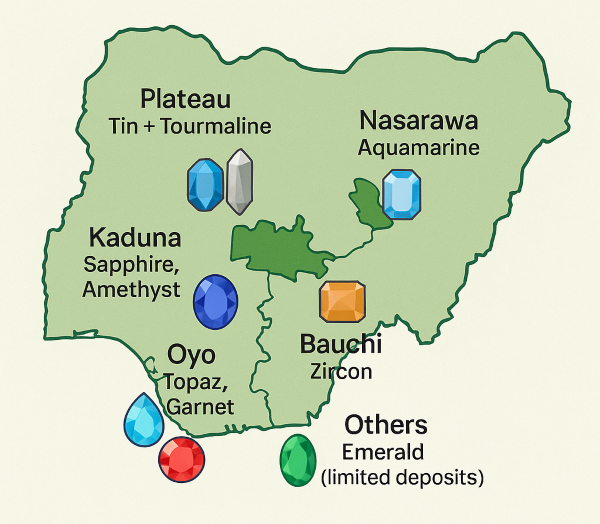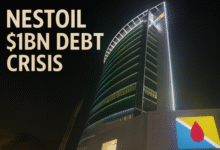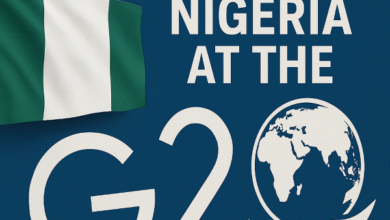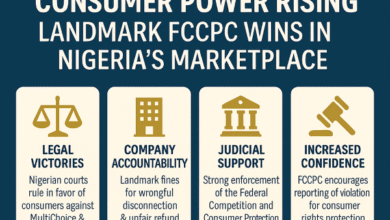Nigeria’s Gemstone Conference 2025 Seeks Sustainable Financing to Unlock $Billion-Dollar Sector

Nigeria’s nascent gemstone and jewelry industry is set to take centre stage this year as the Gemstone Miners and Marketers Association of Nigeria (GMMAN) hosts the 3rd Nigeria Gemstone and Jewelry Expo (NGJE 2025). Scheduled for August 25–27 at the University of Ibadan International Conference Centre, the conference will focus on one pressing theme: “Financing Sustainable Practices in Gemstone Mining, Processing, Jewelry Production and Marketing.”
With global demand for gemstones soaring and Nigeria richly endowed with varieties such as sapphire, tourmaline, garnet, aquamarine, and topaz, the conversation has shifted from resource potential to financing bottlenecks and how to create a globally competitive, value-driven gemstone ecosystem.
Why Financing Is the Missing Link
According to GMMAN President, Adeniran Ajibade, access to sustainable financing remains the industry’s greatest challenge. Nigerian miners and processors struggle under an unfriendly financial regime, where bank loans attract interest rates of up to 32%, compared to just 4–6% in developed economies.
This financing gap, Ajibade notes, has stifled investment in exploration, modern mining techniques, and value addition. As a result, Nigeria remains stuck at the “initial level of development,” exporting raw stones at a fraction of their processed value while missing opportunities in jewelry manufacturing and export.
By targeting sustainable financing models, the NGJE 2025 aims to bring together international dealers, private investors, policymakers, and value-chain players to explore alternative funding sources—from blended finance and venture capital to development bank credit lines and ESG-linked funds.
Nigeria’s Untapped Gemstone Potential
Nigeria’s gemstone deposits, spread across Plateau, Kaduna, Oyo, and other states, have been described by experts as some of the most diverse in Africa. Yet, despite decades of artisanal mining, the sector contributes little to GDP compared to its potential.
Key constraints include:
- Lack of value addition: Most gemstones are exported in raw form.
- Weak policy enforcement: Despite a mining roadmap, execution has lagged.
- Financing drought: High-risk perception deters banks, leaving operators stranded.
- Informality and smuggling: A significant percentage of gemstone trade remains unrecorded.
The result: Nigeria loses billions in potential export earnings, jobs, and industrial growth each year.
The 2025 Conference: Agenda for Change
The NGJE 2025 conference will be both technical and policy-driven, with sessions tailored to address systemic challenges. Key topics include:
- Government Policy & Investment Support in Mining and Gemstones
- Control Blasting Techniques for Safe, Efficient Mining
- Unlocking the Potentials of Nigeria’s Jewelry Industry
- Case Studies in Mining Finance Success
Importantly, financiers and entrepreneurs who have successfully raised capital for gemstone projects will share their models, providing practical roadmaps for operators.
Why Sustainable Financing Matters
The emphasis on sustainability is no coincidence. Investors increasingly demand that mining ventures address climate change, environmental impact, and community livelihoods. By embedding sustainability, Nigeria’s gemstone sector can align with global ESG trends, attract responsible investors, and secure long-term growth.
Ajibade also stressed that while mining finance is inherently high-risk, trading, processing, and jewelry production offer lower-risk entry points for financiers. With the right frameworks, Nigeria could build a robust jewelry industry, retain more value domestically, and position itself in the $100bn global gemstone trade.
BRANDECONOMY Takeaway
The Nigeria Gemstone and Jewelry Expo 2025 represents more than an industry gathering—it is a test of whether Nigeria can move from rhetoric to action in unlocking its non-oil export potential.
If sustainable financing pathways are created, the gemstone sector could become a new growth pole for diversification, creating jobs, saving forex, and boosting Nigeria’s global competitiveness.
For Nigeria, the message is clear: the sparkle of gemstones lies not just in the mines, but in the financing models that turn raw stones into national wealth.











